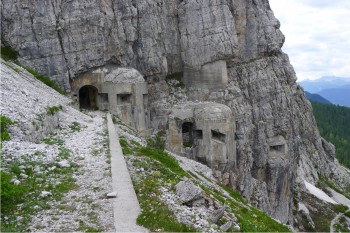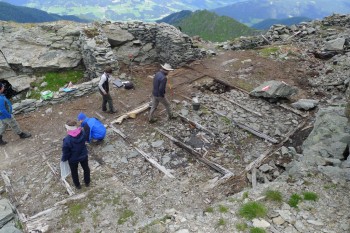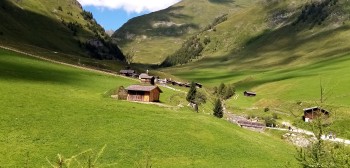The Platform Cultural Heritage Cultural Production of the Faculty of Design and Art of the Free University of Bozen-Bolzano was initiated by the Autonomous Province of Bozen-Bolzano/South Tyrol and the Free University of Bozen-Bolzano and is jointly financed.
– Prof. Nitzan Cohen, Dean of the Faculty of Design and Art, is the scientific supervisor of the platform,
– Dr. Waltraud Kofler Engl, art historian and heritage expert, is the director,
– Dr. Gaia Piccarolo, architect and architectural historian, and Dr. Simone Westermann, art historian, are current researchers of the platform (see former collaborators).
Research
The platform, as originally conceptualised by Prof. Dr. Stephan Schmidt-Wulffen and Dr. Waltraud Kofler Engl, is based on a conception of culture as collective production. Theories of sociology, anthropology and cultural studies serve as the basis for developing a praxeological concept of culture. A central aspect is that research and intervention can no longer be separated: the practice of the platform itself participates in the negotiation of cultural processes and addresses the challenges of the participatory approach. The platform’s research projects focus on practices and communities of practice, exploring regional cultural heritage in practices and letting alternative narratives and strategies emerge. Scientific methods are always accompanied by interventions in specific situations, where the skills of researchers, docents and students from the Faculty of Design and Art are used. The platform’s method is therefore characterized by a specific cooperation between theory and practice that combines research and intervention, allowing theoretical reflections to be rooted in practice.
Applied research and teaching
The methodological approach that links the cultural heritage, cultural production and craft traditions of the region is integrated into the university teaching of the Faculty of Design and Art and into the General Studium. In the design of cultural products and practices, theoretical and practical knowledge of the historical material heritage and regional craft traditions can increase the potential for contemporary development and bring traditional craft techniques into a new context by applying their principles to modern and contemporary materials. The platform offers scientific support (basic research, conferences, field research, etc.) to stakeholders, associations, schools and others groups that work on local and regional cultural heritage projects. In addition, teachers and students of the Faculty of Design and Art will be involved in concrete projects on cultural heritage, networking the university, the territory and local communities.
For the users of our site, we are making available some of the main official documents that have, for nearly a century, constituted the reference guidelines for the restoration, conservation, protection, and valorization of cultural heritage in the broadest sense. By clicking on each link, you will be taken directly to the full texts of the listed Heritage Charters. Paging through these documents – from the historical to the most recent ones – will provide build an overview of the constant evolution of the concept of cultural heritage and the tools for its management.
The Athens Charter for the Restoration of Historic Monuments, 1931
The Italian Charter of Restoration, 1932
Venice Charter, 1964
Burra Charter, 1979, revised in 1999
Historic Gardens (The Florence Charter), 1981
Charter for the Protection and Management of the Archaeological Heritage (Lausanne Charter), 1990
Florence Charter on European Cultural Heritage, 1991
The Nara Document on Authenticity, 1994
Principles for Conservation and Restoration of Built Heritage: The Charter of Krakow, 2000
Convention for the Safeguarding of the Intangible Cultural Heritage, 2003
Convention on the Value of Cultural Heritage for Society (Faro Convention), 2005
The Florence Declaration on Heritage and Landscape as Human Values, 2014
Davos Declaration, 2018
Heritage and the Sustainable Development Goals: Policy Guidance for Heritage and Development Actors, Icomos, 2021



